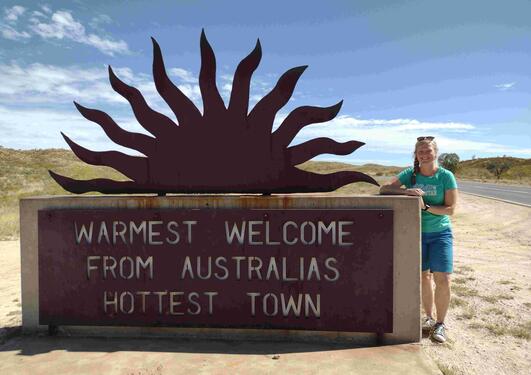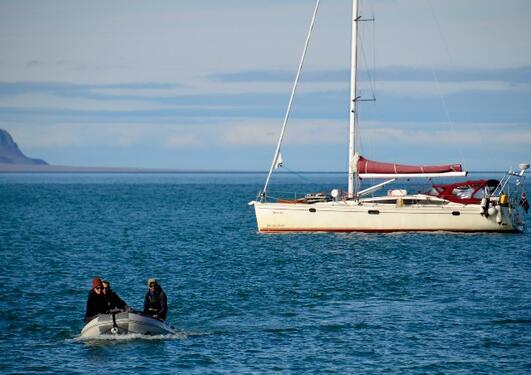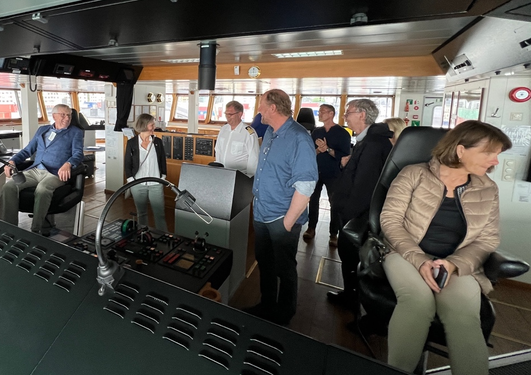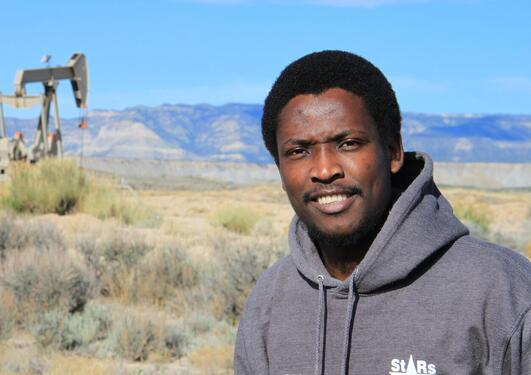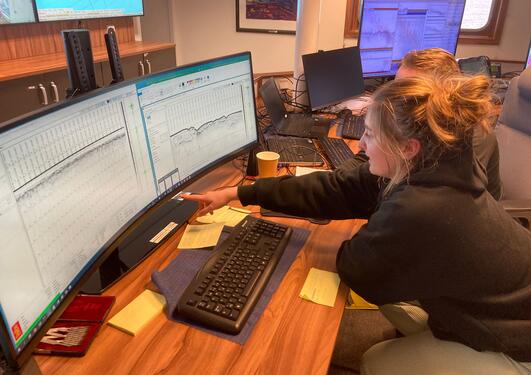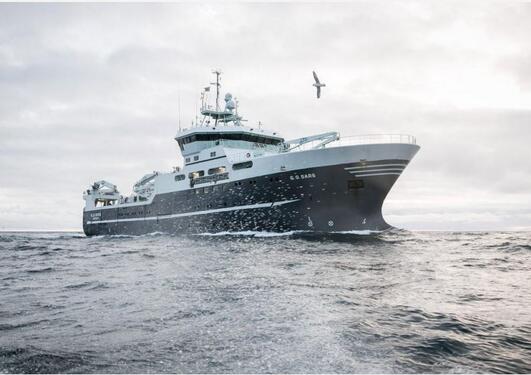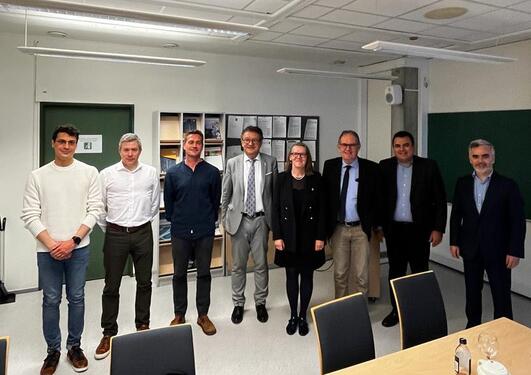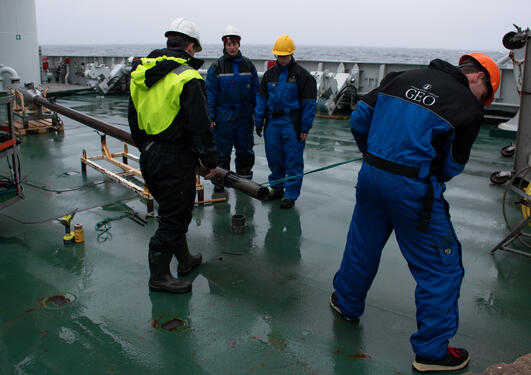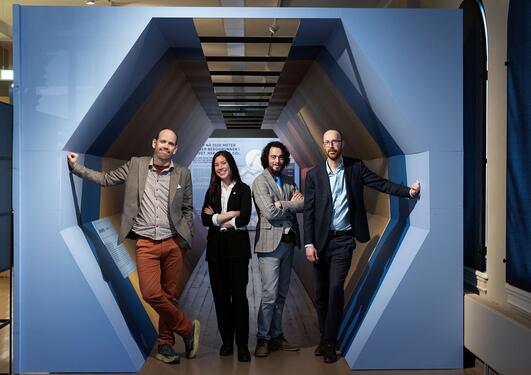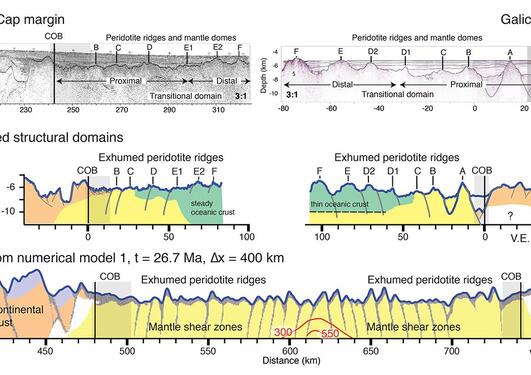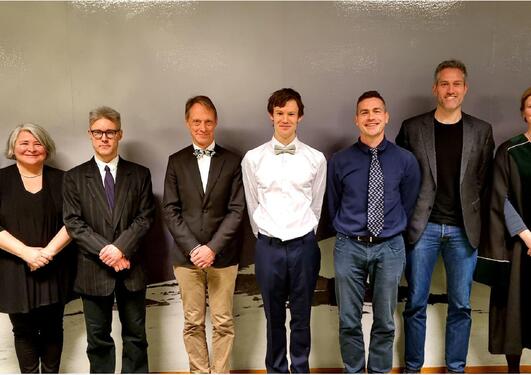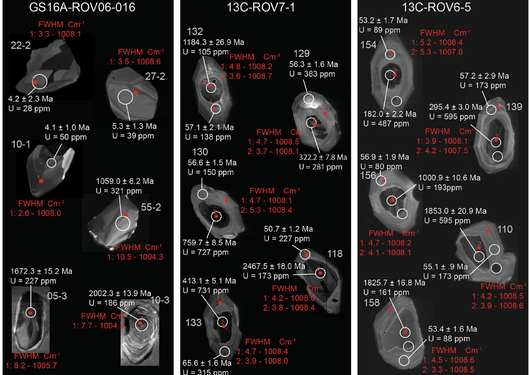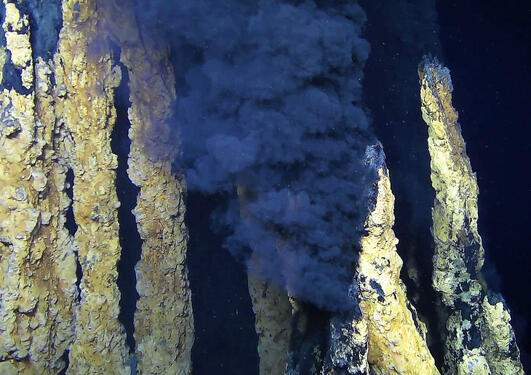News archive for Department of Earth Science
While the majority of the Centre for Deep Sea researchers have gone out to the Norwegian Sea this summer to study seafloor processes and hydrothermal vents, Desiree Roerdink flew to the other side of the world to do exactly the same thing – in rocks that are more than three billion years old.
On Friday 17. June Edoseghe Osagiede defended his thesis "The structural evolution of rift fault networks: From pre-existing structural controls to topological characterisation of the northern North Sea Rift System"
The R/V G.O. Sars has reached day 5 of its 10 day cruise to the offshore wind sites Utsira Nord and Sørlige Nordsjø II in the North Sea.
Friday 10th of June R/V G.O. Sars set its course towards the southern North Sea to start UiB's first scientific cruise to investigate ground conditions for foundations and anchoring of offshore wind farms.
The first week in June UIB GEO has been hosting the Summer School for the Marie Curie Innovative Training Project "S2S Future: Signal Propagation from Source to Sink for the Future of Earth Resources and Energy". 13 PhD candidates have come from universities in France, Germany, UK, Netherlands, Norway, Spain and Switzerland to learn and work together in western Norway.
Researchers demonstrate how we can make use of pores to solve some of the greatest challenges before us – such as the global climate crisis.
Researchers from the Department of Earth Science of the University of Bergen explain in a paper published in Nature Communications how exhumed mantle domes form at magma-poor continental margins and at ultra-slow mid-oceanic spreading systems controlled by frictional shear zones.
A recent article from Tor Einar Møller on exploring how microbes can shed light on ancient climate conditions has been featured on a SCIPOD episode.
Raman spectroscopy of zircon allows distinction between truly inherited zircon and those that may be introduced through sample processing.
When did Earth change from a water world into a planet with continents rising above sea level? Together with researchers from The Netherlands and Germany, associate professor Desiree Roerdink from the Department of Earth Science and Centre for Deep Sea Research has found that land appeared very early in Earth’s history – up to one billion years earlier than we previously thought.
Albina Gilmullina (PhD UiB Geo 2021 with Christian Haug Eide as main supervisor leader) was yesterday awarded the "Harold Reading Medal" from the British Sedimentological Research Group. It is awarded to the person who has submitted " best publication arising directly from a PhD project in the field of sedimentology and stratigraphy during the previous year". Out of ten nominees mostly from the... Read more
The new centre is led by NORCE with UiB as a major partner, together with a range of international institutions, industry and technology providers. Within UiB, GEO, Maths and Physics and Technology are the main departments involved in the centre.
A competence building project led by Pedro Ribeiro, a researcher at the Centre for Deep-Sea Research of the University of Bergen, will investigate if deep-sea mining on the Arctic Mid-Ocean Ridge can take place responsibly, avoiding serious harm to the environment.
Pages
- December 2025 (3)
- November 2025 (1)
- October 2025 (4)
- September 2025 (1)
- August 2025 (1)
- February 2025 (3)
- January 2025 (1)
- December 2024 (1)
- November 2024 (1)
- October 2024 (3)
- September 2024 (4)
- August 2024 (2)
- July 2024 (3)
- June 2024 (2)
- April 2024 (3)
- March 2024 (1)
- February 2024 (2)
- December 2023 (2)
- November 2023 (4)
- October 2023 (2)
- September 2023 (1)
- August 2023 (3)
- July 2023 (4)
- June 2023 (1)
- April 2023 (4)
- March 2023 (2)
- February 2023 (1)
- January 2023 (2)
- December 2022 (1)
- November 2022 (8)
- October 2022 (1)
- August 2022 (2)
- June 2022 (6)
- May 2022 (1)
- April 2022 (1)
- March 2022 (3)
- February 2022 (2)
- December 2021 (2)
- November 2021 (2)
- October 2021 (1)
- September 2021 (2)
- July 2021 (1)
- June 2021 (9)
- May 2021 (1)
- February 2021 (1)
- September 2020 (2)
- June 2020 (2)
- May 2020 (1)
- April 2020 (2)
- November 2019 (1)
- October 2019 (1)
- April 2019 (1)
- February 2019 (4)
- January 2019 (2)
- December 2018 (1)
- October 2018 (6)
- June 2018 (3)
- March 2018 (1)
- February 2018 (1)
- January 2018 (2)
- December 2017 (2)
- November 2017 (4)
- October 2017 (3)
- September 2017 (1)
- July 2017 (1)
- May 2017 (1)
- March 2017 (1)
- February 2017 (1)
- January 2017 (2)
- December 2016 (1)
- November 2016 (1)
- October 2016 (2)
- September 2016 (2)
- August 2016 (1)
- June 2016 (3)
- May 2016 (3)
- April 2016 (1)
- March 2016 (1)
- January 2016 (1)
- November 2015 (2)
- October 2015 (3)
- June 2015 (2)
- May 2015 (1)
- March 2015 (1)
- February 2015 (1)
- November 2014 (1)
- October 2014 (4)
- May 2014 (2)
- March 2014 (1)
- January 2014 (1)
- December 2013 (4)
- November 2013 (1)
- October 2013 (5)
- August 2013 (1)
- June 2013 (1)
- May 2013 (2)
- April 2013 (2)
- February 2013 (1)
- January 2013 (3)
- December 2012 (1)
- October 2012 (1)
- September 2012 (1)
- August 2012 (1)
- March 2012 (1)
- January 2012 (1)
- December 2011 (2)
- November 2011 (5)
- October 2011 (4)
- September 2011 (6)
- July 2011 (3)
- June 2011 (6)
- May 2011 (4)
- April 2011 (2)
- March 2011 (5)
- February 2011 (2)
- January 2011 (1)
- December 2010 (2)
- November 2010 (3)
- October 2010 (2)
- September 2010 (1)
- June 2010 (4)
- May 2010 (2)
- April 2010 (3)
- March 2010 (3)
- February 2010 (3)
- January 2010 (3)
- September 2009 (1)
- August 2009 (2)
- July 2009 (1)
- June 2009 (4)
- March 2009 (2)
- February 2009 (1)
- January 2009 (1)
